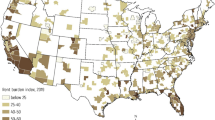Abstract
This paper examines residential satisfaction and the factors that influence it within the context of Harare’s selected informal settlements (Hopley, Hatcliffe extension and Epworth ward 7). The study presents interesting findings from regression analysis; some of which challenge the dominant narratives that characterize deprived neighbourhoods as having low residential satisfaction. From the bivariate (OR = 1.600, p < 0.05) and multivariate (OR = 1.647, p < 0.05) analyses, residents with strong social networks have higher odds of being very satisfied with their residence compared to residents with weak social networks. Also, long-time residents (OR = 1.671, p < 0.01) were found to be very satisfied with their residence compared to newcomers. Additionally, respondents who agreed to receive help from local politicians have higher odds (OR = 1.851, p < 0.01) of very satisfied residential satisfaction compared to those who did not receive help from local politicians. Furthermore, place attachment is significantly associated with very satisfied residential satisfaction. Residents with high place attachment (OR = 1.535, p < 0.05) are more likely to be very satisfied with their residence compared to those with low place attachment. The implications of the findings for urban policy and practice are also highlighted.





Similar content being viewed by others
Data availability
The data that support the findings of this study are available on request from the second author.
References
Abdu, A., & Hashim, A. H. (2015). Comparison of residential satisfaction among young households in three unplanned neighbourhoods in Kano Metropolis, Nigeria. IOSR Journal of Humanities and Social Science (IOSR-JHSS), 20(3), 42–53
Addo, I. A. (2016). Assessing residential satisfaction among low-income households in multi-habited dwellings in selected low-income communities in Accra. Urban Studies, 53(4), 631–650
Adewale, B. A., Ibem, E. O., Amole, B., & Adeboye, A. B. (2019). Assessment of residential satisfaction in the core area of Ibadan Metropolis, Nigeria. Journal of Human Behavior in the Social Environment, 29(2), 206–233
Amérigo, M., & Aragonés, J. I. (1990). Residential satisfaction in council housing. Journal of Environmental Psychology, 10(4), 313–325
Amietsenwu, B. V., & Ajayi, C. A. (2010). Occupants’ satisfaction and rent paid for residential properties close to waste dump sites in Nigeria. Journal of Sustainable Development, 3(1), 89–103
Arku, G., Luginaah, I., Mkandawire, P., Baiden, P., & Asiedu, A. B. (2011). Housing and health in three contrasting neighbourhoods in Accra, Ghana. Social Science & Medicine, 72(11), 1864–1872
Bandauko, E., Kutor, S. K., Nyantakyi-Frimpong, H., Baiden, P., & Arku, G. (2022). Influence of socio-demographic factors and housing characteristics on satisfaction with privacy in gated communities in Accra (Ghana). Housing Studies. https://doi.org/10.1080/02673037.2022.2077920
Bandauko, E., Kutor, S. K., Annan-Aggrey, E., & Arku, G. (2022). “They say these are places for criminals, but this is our home”. Internalizing and countering discourses of territorial stigmatization in Harare’s informal settlements. International Development Planning Review, 44(2), 217–240
Bandauko, E., Kutor, S. K., & Arku, G. (2022). To leave or not to leave? An analysis of individual and neighbourhood characteristics shaping place attachment in Harare’s selected informal settlements. The Canadian Geographer/Le Géographe canadien. https://doi.org/10.1111/cag.12743
Bandauko, E., Kutor, S. K., & Arku, R. N. (2022). Trapped or not trapped? An empirical investigation into the lived experiences of the urban poor in Harare’s selected informal settlements. African Geographical Review. https://doi.org/10.1080/19376812.2022.2077781
Baiden, P., Arku, G., Luginaah, I., & Asiedu, A. B. (2011). An assessment of residents’ housing satisfaction and coping in Accra, Ghana. Journal of Public Health, 19(1), 29–37
Bradley, Q. (2017). Neighbourhood planning and the impact of place identity on housing development in England. Planning Theory & Practice, 18(2), 233–248
Buys, L., & Miller, E. (2012). Residential satisfaction in inner urban higher-density Brisbane, Australia: Role of dwelling design, neighbourhood and neighbours. Journal of Environmental Planning and Management, 55(3), 319–338. doi:https://doi.org/10.1080/09640568.2011.597592
Byun, G., & Ha, M. (2016). The factors influencing residential satisfaction by public rental housing type. Journal of Asian Architecture and Building Engineering, 15(3), 535–542
Caldieron, J. (2011). Residential satisfaction in la Perla informal neighborhood, San Juan, Puerto Rico. OIDA International Journal of Sustainable Development, 2(11), 77–84
Casakin, H., & Reizer, A. (2017). Place attachment, residential satisfaction, and life satisfaction: Traditional and renewed kibbutz. Journal of Human Behavior in the Social Environment, 27(7), 639–655
Chikowore, N. (2021). Factors influencing household waste management practices in Zimbabwe. Journal of Material Cycles and Waste Management, 23(1), 386–393
Chirisa, I., Gaza, M., & Bandauko, E. (2014). Housing and the Politics of Local Organization and Representation in Peri-Urban Harare, Zimbabwe. African Studies Quarterly, 15(1), 38–53. https://asq.africa.ufl.edu/chirisa-gaza-bandauko_december14/
Clement, O. I., & Kayode, O. (2012). Public housing provision and user satisfaction in Ondo State, Nigeria. British Journal of Arts and Social Sciences, 8(1), 103–111
Coker, A. O., Awokola, O. S., Olomolaiye, P., & Booth, C. (2008). Challenges of urban housing quality and its associations with neighbourhood environments: Insights and experiences of Ibadan City, Nigeria. Journal of Environmental Health Research, 7(1), 21–30
Curtis, S. (2010). Space, place and mental health. Burlington, VT: Ashgate
Davis, E., & Fine-Davis, M. (1981). Predictors of satisfaction with housing and neighbourhood: a nationwide study in the Republic of Ireland. Social Indicators Research, 9(4), 477–494
Dekker, K., de Vos, S., Musterd, S., & van Kempden, R. (2011). Residential satisfaction in housing estates in European cities: A multi-level research approach. Housing Studies, 26, 479–499
Dimuna, K. O., & Omatsone, M. E. O. (2010). Regeneration in the Nigerian urban built environment. Journal of Human Ecology, 29(2), 141–149. doi:https://doi.org/10.1080/09709274.2010.11906256
Dunn, J. R. (2000). Housing and health inequalities: review and prospects for research. Housing Studies, 15(3), 341–366
Dunn, J. R., Hayes, M. V., Hulchanski, J. D., Hwang, S. W., & Potvin, L. (2006). Housing as a socio-economic determinant of health: Findings of a national needs, gaps and opportunities assessment. Canadian Journal of Public Health, 97(3), S12–S17
Gan, X., Zuo, J., Ye, K., Li, D., Chang, R., & Zillante, G. (2016). Are migrant workers satisfied with public rental housing? A study in Chongqing, China. Habitat International, 56, 96–102
Giddens, A. (1991). Modernity and self-identity: Self and society in the late modern age. Cambridge: Polity Press
Giuliani, M. V. (2003). Theory of attachment and place attachment. In M. Bonnes, T. L, & M. Bonaiuto (Eds.), Psychological theories for environmental issues (pp. 137–170). Aldershot: Ashgate
Hashim, A. H. (2003). Residential satisfaction and social integration in public low-cost housing in Malaysia. Pertanika Journal of Social Science and Humanity, 11(1), 1–10
Ibem, E. O., & Amole, D. (2013). Residential satisfaction in public core housing in Abeokuta, Ogun State, Nigeria. Social Indicators Research, 113(1), 563–581
Ibem, E. O., Ayo-Vaughan, E. A., Oluwunmi, A. O., & Alagbe, O. A. (2019). Residential satisfaction among low-income earners in government-subsidized housing estates in Ogun State, Nigeria. Urban Forum, 30(1), 75–96
Koch, F., & Ahmad, S. (2018). How to measure progress towards an inclusive, safe, resilient and sustainable city? Reflections on applying the indicators of sustainable development goal 11 in Germany and India. Urban Transformations (pp. 77–90). Cham: Springer
Li, J., Li, D., Ning, X., Sun, J., & Du, H. (2019). Residential satisfaction among resettled tenants in public rental housing in Wuhan, China. Journal of Housing and the Built Environment, 34(4), 1125–1148
Li, Z., & Wu, F. (2013). Residential satisfaction in China’s informal settlements: A case study of Beijing, Shanghai, and Guangzhou. Urban Geography, 34(7), 923–949
Lu, M. (1999). Determinants of residential satisfaction: Ordered logit versus regression models. Growth and Change, 30(2), 264–287
Luginaah, I., Arku, G., & Baiden, P. (2010). Housing and health in Ghana: The psychosocial impacts of renting a home. International Journal of Environmental Research and Public Health, 7(2), 528–545
Massey, R. T. (2017, June). The effect of informal settlement upgrading on women’s social networks: layout versus location. Urban Forum (28 vol., pp. 205–217). Springer Netherlands. 2
Matamanda, A. R. (2020a). Battling the informal settlement challenge through sustainable city framework: experiences and lessons from Harare, Zimbabwe. Development Southern Africa, 37(2), 217–231
Matamanda, A. R. (2020b). Living in an emerging settlement: The story of Hopley farm settlement, Harare Zimbabwe. Urban Forum, 31(4), 473–487
McGee, C., Wynne, L., & Lehmann, S. (2017). Housing innovation for compact, resilient cities. Growing Compact: Urban Form, Density & Sustainability. London: Taylor & Francis, 287 – 99
McGregor, J., & Chatiza, K. (2020a). Partisan citizenship and its discontents: precarious possession and political agency on Harare City’s expanding margins. Citizenship Studies, 24, 1
McGregor, J., & Chatiza, K. (2020b). Geographies of urban dominance: The politics of Harare’s periphery. ESID Working Paper No. 162. Manchester, UK: The University of Manchester. http://www.effective-states.org/
Mohit, M. A., Ibrahim, M., & Rashid, Y. R. (2010). Assessment of residential satisfaction in newly designed public low-cost housing in Kuala Lumpur. Malaysia Habitat International, 34, 18–27
Morgner, C., Ambole, A., Anditi, C., & Githira, D. (2020). Exploring the dynamics of social networks in urban informal settlements: the case of Mathare Valley, Kenya. Urban Forum, 31(4), 489–512
Mridha, M. (2020). The effect of age, gender and marital status on residential satisfaction. Local Environment, 25(8), 540–558
Muchadenyika, D. (2015). Slum upgrading and inclusive municipal governance in Harare, Zimbabwe: New perspectives for the urban poor. Habitat International, 48, 1–10
Muchadenyika, D. (2020). Seeking Urban Transformation: Alternative Urban Futures in Zimbabwe. Harare. Weaver Press
Ogu, V. I. (2002). Urban residential satisfaction and the planning implications in a developing world context: The example of Benin City, Nigeria. International Planning Studies, 7(1), 37–53. doi:https://doi.org/10.1080/13563470220112599
Okoye, V. U., & Chigbu, N. (2017). Determinants of public housing satisfaction in Enugu Urban, Nigeria. International Invention Journal of Engineering Science and Technology, 3(1), 9–14
Oldman, C. (2005). The importance of housing and home. Understanding Care, Welfare and Community (pp. 348–358). Routledge
Ozaki, R. (2002). Housing as a reflection of culture: Privatised living and privacy in England and Japan. Housing Studies, 17(2), 209–227
Redden, M., Gahagan, J., Kia, H., Humble, Á. M., Stinchcombe, A., Manning, E., & Thomas, R. (2021). Housing as a determinant of health for older LGBT Canadians: Focus group findings from a national housing study.Housing and Society,1–25
Riazi, M., & Emami, A. (2018). Residential satisfaction in affordable housing: A mixed method study. Cities, 82, 1–9. https://doi.org/10.1016/j.cities.2018.04.013
Rolfe, S., Garnham, L., Godwin, J., Anderson, I., Seaman, P., & Donaldson, C. (2020). Housing as a social determinant of health and wellbeing: developing an empirically-informed realist theoretical framework. Bmc Public Health, 20(1), 1–19
Salleh, A. G. (2008). Neighbourhood factors in private low-cost housing in Malaysia. Habitat International, 32(4), 485–494
Shahriari, S. K. S., Karimzadeh, A., & Shahriari, S. (2014). Evaluating the satisfaction rate of low-income communities about low-cost housing: Case study of Abadeh Mehr housing in Iran. International Journal of Architecture and Urban Development, 4(4), 33–38
Tao, L. W. (2018). Survey of the critical issue of the public housing privacy to influence on residents’ living condition in Hong Kong. HBRC journal, 14(3), 288–293
Terzano, K. (2014). Residential Satisfaction. In A. C. Michalos (Ed.), Encyclopedia of Quality of Life and Well-Being Research. Dordrecht: Springer. https://doi.org/10.1007/978-94-007-0753-5_2491
Türkoğlu, H., Terzi, F., Salihoğlu, T., Bölen, F., & Okumuş, G. (2019). Residential satisfaction in formal and informal neighborhoods: the case of Istanbul, Turkey.Archnet-IJAR: International Journal of Architectural Research
Vale, L. J., Shamsuddin, S., Gray, A., & Bertumen, K. (2014). What affordable housing should afford: Housing for resilient cities. Cityscape, 16(2), 21–50
Ukoha, O. M., & Beamish, J. O. (1997). Assessment of residents’ satisfaction with public housing in Abuja, Nigeria. Habitat International, 21(4), 445–460
Vera-Toscano, E., & Ateca-Amestoy, V. (2008). The relevance of social interactions on housing satisfaction. Social Indicators Research, 86(2), 257–274
Wacquant, L. (1993). Urban Outcasts: Stigma and Division in the Black American Ghetto and the French Urban Periphery. International Journal of Urban and Regional Research, 17, 366–383
Wokekoro, E. (2015). Residents’ satisfaction with residential quality of life in informal settlements in Port Harcourt municipality. European Journal of Research in Social Sciences, 3(3), 1–17
Zeng, H., Ke, Q., & Yu, X. (2021). Investigating the factors affecting the residential satisfaction of new-generation migrants: a case study of Hangzhou in China. International Journal of Urban Sciences, 25(1), 16–30
Zimstats (2012). National Census Report. Government of Zimbabwe. Harare
Acknowledgements
The second author acknowledges the University of Sussex’s Migrants on the Margins research project (Grant No. ES/ N01474X/1). He specifically expresses appreciation to Professor Michael Collyer, the Principal Investigator on this project, for granting permission to use the data to write this paper. He also acknowledges the Development Governance Institute, a research institutional partner on the Migrants on the Margins project, for providing recent maps of the three informal settlements. All the authors appreciate the support of Karen Vankerkoerle (Department of Geography and Environment, University of Western Ontario) for drawing the map showing the location of the three study sites. Additionally, the authors thank the three anonymous reviewers for their constructive comments.
Funding
The data used in this study was drawn from the Migrants on the Margins research project (Grant No. ES/ N01474X/1), which was funded by the Royal Geographical Society (RGS).
Author information
Authors and Affiliations
Corresponding author
Ethics declarations
Conflicts of interest/competing interests
The authors have no relevant financial or non-financial interests to disclose.
Additional information
Publisher’s note
Springer Nature remains neutral with regard to jurisdictional claims in published maps and institutional affiliations.
Rights and permissions
Springer Nature or its licensor holds exclusive rights to this article under a publishing agreement with the author(s) or other rightsholder(s); author self-archiving of the accepted manuscript version of this article is solely governed by the terms of such publishing agreement and applicable law.
About this article
Cite this article
Kutor, S.K., Bandauko, E., Kyeremeh, E. et al. Residential satisfaction in deprived urban neighbourhoods: a case study of Harare’s selected informal settlements. J Hous and the Built Environ 38, 1177–1199 (2023). https://doi.org/10.1007/s10901-022-09969-7
Received:
Accepted:
Published:
Issue Date:
DOI: https://doi.org/10.1007/s10901-022-09969-7




